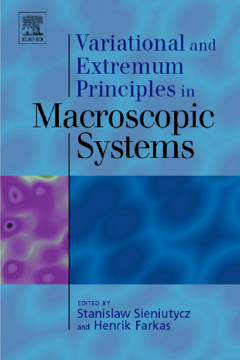
BOOK
Variational and Extremum Principles in Macroscopic Systems
Stanislaw Sieniutycz | Henrik Farkas
(2010)
Additional Information
Book Details
Abstract
Recent years have seen a growing trend to derive models of macroscopic phenomena encountered in the fields of engineering, physics, chemistry, ecology, self-organisation theory and econophysics from various variational or extremum principles. Through the link between the integral extremum of a functional and the local extremum of a function (explicit, for example, in the Pontryagin’s maximum principle variational and extremum principles are mutually related. Thus it makes sense to consider them within a common context.
The main goal of Variational and Extremum Principles in Macroscopic Systems is to collect various mathematical formulations and examples of physical reasoning that involve both basic theoretical aspects and applications of variational and extremum approaches to systems of the macroscopic world.
The first part of the book is focused on the theory, whereas the second focuses on applications. The unifying variational approach is used to derive the balance or conservation equations, phenomenological equations linking fluxes and forces, equations of change for processes with coupled transfer of energy and substance, and optimal conditions for energy management.
- A unique multidisciplinary synthesis of variational and extremum principles in theory and application
- A comprehensive review of current and past achievements in variational formulations for macroscopic processes
- Uses Lagrangian and Hamiltonian formalisms as a basis for the exposition of novel approaches to transfer and conversion of thermal, solar and chemical energy
"Due to the large number of diverse scientific papers published in this field there is a need for a publication, which would present in a versatile, synthetic and modern way the progress in theory that has been made in recent times".
Professor Tadeusz Mizerski
